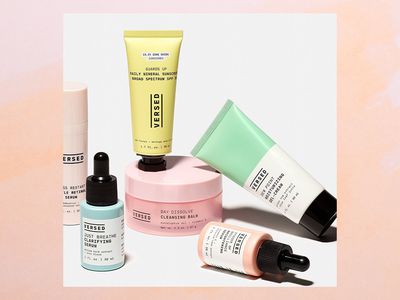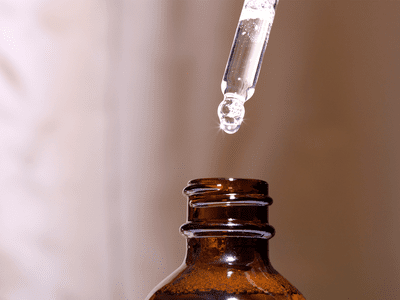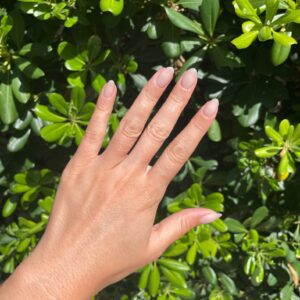
How to Use It The Final Takeaway
If you spend any time scrolling through skincare TikTok, there’s a good chance you’ve recently come across creators touting rice water’s potential to bring you smooth, glowing “glass skin.” While it may seem that rice water has only recently entered the zeitgeist, it’s actually been a popular skincare ingredient for hundreds of years in Asian cultures, so there’s tons of evidence supporting the benefits—and whether they align with the rave reviews circulating social media. We reached out to leading dermatologists for their take—keep reading to learn everything you need to know about rice water for skin, from the benefits to how to use it.
What Is Rice Water?
Rice water is pretty much exactly what it sounds like: a liquid made by soaking rice, then straining to separate the enhanced water. In skincare, it usually functions as a toner or helps to calm skin. “Rice water has been used for centuries throughout Asia for its reported beauty benefits,” board-certified dermatologist Howard Sobel, MD, tells us. “Its inherent high-starch, vitamin, and antioxidant capabilities can be used to treat skin by brightening or lightening dark spots and uneven skin tone, toning and firming, and calming skin inflammation and breakouts.” While this skincare ingredient is easy to DIY, you can also buy skincare products that contain rice water, such as a rice water or rice milk toner.
Benefits of Rice Water for Skin
- Free-Radical Protection: Rice water is rich in antioxidants, which may help protect your skin from the sun’s harmful effects. “In one study, it was able to block free radical formation from UV exposure,” says board-certified dermatologist and Dr. Loretta founder Loretta Ciraldo, MD. “It holds some promise as an effective skincare ingredient to help prevent photoaging.” One study found that when combined with some other plant extracts, rice water worked as a sunscreen. However, dermatologists don’t recommend using it this way. “Always use mineral SPF to thoroughly protect skin from environmental stressors and the sun’s damaging rays,” Sobel says.
- Anti-Aging Properties: “[Rice water] has also been shown to block the activity of elastase, one of the enzymes that breaks down elastic fibers and leads to wrinkles and sagging as we age,” Ciraldo says. Further research is necessary to better understand rice water’s potential anti-aging benefits.
- Hydration: Rice water has hydrating properties and may help smooth your skin’s surface and improve its texture.
- Soothes Irritation: High in starch and vitamins, rice water may help calm irritated skin. The studies are limited, but some suggest that rice water may have anti-inflammatory effects that can help with conditions like dry skin and eczema. “Although there are no conclusive studies proving these benefits, it makes sense that a nutrient-rich solution containing both hydrating and anti-inflammatory ingredients would help with these conditions,” says board-certified dermatologist Arash Akhavan, MD.
- May Fade Hyperpigmentation: More research is needed, but rice water may have skin-brightening effects, which could potentially be helpful for fading hyperpigmentation. “Inositol is a sugar found in rice water that has been shown in studies to have potential skin-brightening or lightening effects,” Akhavan says. “It is thought that the use of rice water may also have these benefits in people with hyperpigmentation.”
Potential Side Effects
Unless you're allergic to rice, dermatologists say there aren't many side effects you need to worry about when using rice water for skin. If you have very dry or dehydrated skin, rice water may not be the best choice because it can have drying effects, Sobel tells us.
For some people, rice water may leave a bit of a tacky feeling on the skin. If you're looking to avoid this, Ciraldo recommends using the product sparingly and making sure it dries completely before applying other products.
How to Use It
Rice water has the most benefits for skin as a toner, and is suitable for use once or twice a day after cleansing. To negate any drying effects and keep your skin hydrated, it’s a good idea to apply serum and/or moisturizer afterwards, Sobel says. Of course, like with most skincare products, you’ll want to start with a patch test on a small area of skin to see how your skin reacts.
To make your own rice water, Akhavan suggests soaking a half-cup of rice in two cups of water and allowing it to sit for 30 to 60 minutes. After straining, your rice water is ready to go as a toner. If you're going the DIY route, know that you'll need to make fresh rice water regularly so that it doesn't spoil. "Rice water that has been sitting can become contaminated with bacteria, potentially causing skin infections," Akhavan says.
If making your own rice water isn't for you, head to the store and look for products that contain rice water or rice extract. For many, this is an easier, low-maintenance way to incorporate rice water into their daily skincare routine.
The Final Takeaway
Rice water for skin has been popular for hundreds of years in Japan, Korea, China, and other Asian cultures, and it's easy to see why. Its vitamins, minerals, and antioxidant properties may help soothe inflamed skin, improve texture, and lighten dark spots, among other potential benefits. Rice water doesn't have many side effects for most people, but if you have any concerns, definitely check with a dermatologist before adding it to your skincare routine.
Article Sources Byrdie takes every opportunity to use high-quality sources, including peer-reviewed studies, to support the facts within our articles. Read our editorial guidelines to learn more about how we keep our content accurate, reliable and trustworthy.
-
https://onlinelibrary.wiley.com/doi/10.1111/ics.12316
-
https://www.mdpi.com/2079-9284/5/2/26/htm
-
https://pubmed.ncbi.nlm.nih.gov/35587098/
See More from Byrdie Shopping

11 Must-Try Makeup Tips For Almond-Shaped Eyes From Pro Artists

The Versed Skincare Products Team Byrdie Can't Live Without

How to Use Minoxidil—AKA Rogaine—for Hair Growth, According to Derms


